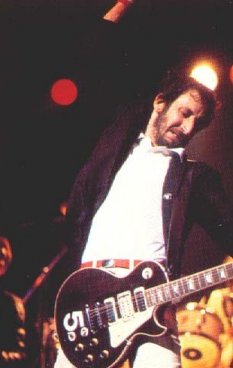
Most individuals fortunate enough to almost live for a century witness many historic changes. Few actually directly cause some of those changes. Guitar legend and innovator Les Paul was one of those people. His name may not be as immediately recognizable as such deceased guitar greats like Jimi Hendrix, Stevie Ray Vaughan or Duane Allman, but his legacy is no less important. Dare I say it may be more important than all of those men.
First as a player. Had Les Paul not been an inventor and just a guitar player, he would still be remembered as one of the greats. His bold use of trills, speed, quick licks and other techniques laid a template for later rock players. As Joe Satriani said in reaction to his death, "he was the original guitar hero." Paul's rapid fire, fluid lines graced many hit records. Between 1949-62, he earned 36 gold records. Many of the records were recorded with his wife at the time, Mary Ford.
ABOVE: Les Paul and Mary Ford. This clip combines his great playing with his technical innovations, as he explains and demonstrates his invention of multi-track recording.
But going beyond his playing, it is his innovations that make Paul one of the most important contributors to music in the 20th century. First, the guy invented the solid body electric guitar. No solid body electric guitar, no rock and roll as we know it. Period. The most popular guitar in history is the Gibson Les Paul guitar. Players from Jimmy Page to Slash swear by the Les Paul. It started out as a solid wood block, "the Log," with strings on it. It is only rivaled by the Fender Stratocaster in popularity amongst rock players.

ABOVE: The Who's Pete Townshend shreds on a Gibson Les Paul guitar
Secondly, Les Paul invented multitrack recording. This is one of the most common recording techniques nowadays. In his garage in the late 1940's, Les recorded the first record using multitrack technology. It seems simple in retrospect, but it was revolutionary at the time. Multitrack recording is where you record one track, and then play it back and overlay a second track on top of that, and so forth. In other words, you can sing a vocal line, and then record yourself singing harmony with yourself over that first track. You no longer needed to record "live" with all instruments and singers going simultaneously. You could do one instrument or voice at a time and then "build" the track from there. In addition, Paul is responsible for inventing delay and phasing effects on the guitar.
ABOVE: Even late in life, Les Paul loved to perform and tinker with technology. Here is Les having some fun with what he playfully calls the "Les Paulverizer." It is actually just showing how multitracking works, and the black box on the guitar is an empty box, a prop.
Terry Stewart, president of the Rock and Roll Hall of Fame and Museum summed it up best when he stated that "[Les Paul's] inventions created the infrastructure for the music and his playing style will ripple through generations. He was truly an architect of rock and roll."
RIP Les Paul.

1 comment:
As a guitar player, I cannot put in words how much I love and appreciate Les Paul for all of his contributions to music and technology. The first "good" guitar I ever owned was a 1966 gold-top Les Paul Custom and I loved that guitar as much as life.
As far as his innovations go... try to imagine the Beatles trying to record "Sgt.Pepper" without multi-track recording. The waves Les made on the musical pond are still rippling upon the shore.
God, Bless him.
Post a Comment